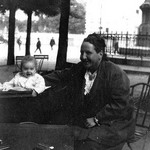In 1922, Hadley did the only thing that Hemingway has ever seriously criticized her for: She lost the valise that had his early manuscripts. Hadley was heading out on a train at the Gare de Lyon Paris railway station to meet Hemingway for vacation of skiing. She filled a valise with his early manuscripts, parts of short stories and all notes that she could find, in the belief that he could work on them while they were away.
When she got off of the train, she realized that she didn’t have the valise. To say that she was horrified doesn’t begin to describe how she felt. Hem found her in tears, totally inconsolable, and while on the surface he took it better than anyone ever could have thought he would, it’s the one thing that rankled for just about forever.
He was more than jolly on the holiday but was devastated when talking to his writer friends. Hemingway went back to Paris immediately and a reward was offered for the manuscripts return but they never were found. The early works would have given great insight into the development and evolution of Hemingway’s writing style.
All that was salvaged was an early version of Up in Michigan and My Old Man, some sketches, and some notes for short stories. What were lost were 11 stories and 20 poems that Hemingway wrote between 1921 and 1922. Ezra Pound suggested that since Hem knew what he was writing about, he should be able to recreate the stories in a better way. However, as most writers believe, your first efforts capture the raw power of your intent and then it’s refined. I know from my own writing that it’s rare that I can recreate the vision of the first draft, even if the first draft is not very good.
Hem tried to be cheerful despite this catastrophe but he did not write on the trip and it’s likely due to the incessant pain of this loss of his works. A publisher however wanted to publish My Old Man and he did begin to write after that. The shocking Up In Michigan was always a tough sell, particularly in the twenties, and his parents found it almost too upsetting to read. His mother’s criticism of it for its sexual themes was especially biting when Hen sought her approval despite his disdain for her.
Some critics and Hemingway scholars believe that since the first drafts were Hemingway’s first efforts at the economy of style that he developed over time, his use of simple language, the idea of leaving out as much as you put in, the loss may have benefited him by letting him begin afresh with the knowledge he’d learned. That’s putting a kind spin on it all. There is no way the loss was good but it was not, perhaps, devastating. Since Hemingway went on to have a career that’s unparalleled in literary history, it wasn’t crippling.

Those who knew Hemingway said he mentioned this incident often in later years. In early years he didn’t talk about it and preferred that no one else talk about it. It was just that painful. The incident was discussed in A Moveable Feast. Hemingway’s sister and some of his friends believe that this event was the beginning of the breakup of the marriage and that Hem never forgave Hadley. As cantankerous as Hemingway could be, I think he did forgive her since in essence A Movable Feast is a love poem to her and their life in Paris in the 1920s.

